 About GamePeople
About GamePeople
Subscribe to the Tired Gamer column:![]() RSS or
RSS or
![]() Newsletter.
Newsletter.
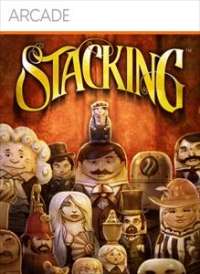
Format:
360
Genre:
Adventuring
Style:
Singleplayer
Further reading:
intertitled dialogue
Modern Times
proles
Karl Denson
Limbo
Little Big Planet
Buy/Support:
Support , click to buy via us...
Other GamePeople columnists have reviewed this from their perspective - huh?:
Story Gamer (360)
Scared Gamer (360)
Tech Gamer (360)
Reporting Gamer (360)
Podcast (360)
Novel Gamer (360)
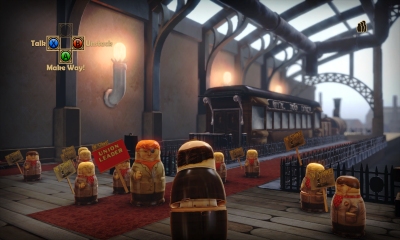
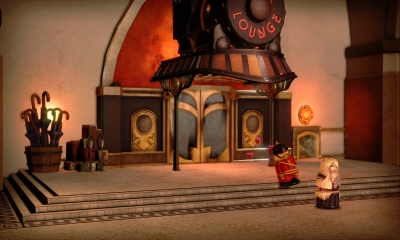
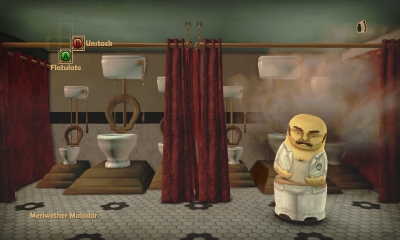
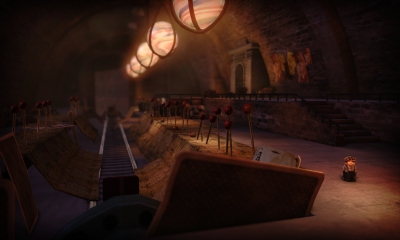
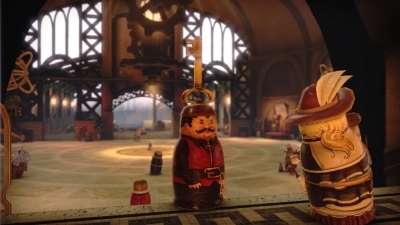
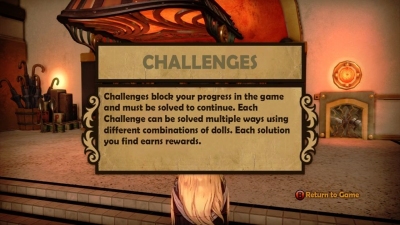
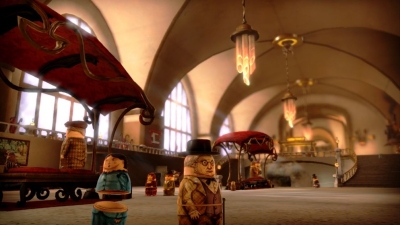
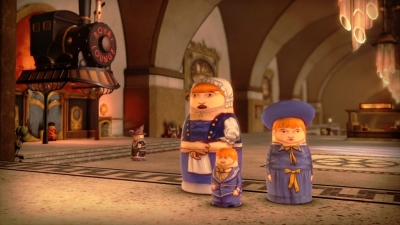
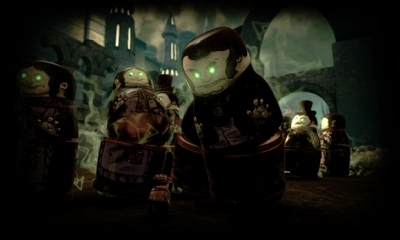
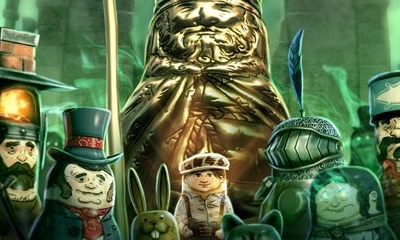
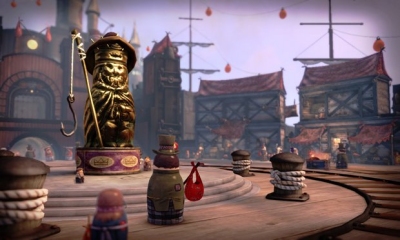


Stacking is the latest in a procession of pure-joy inducing games from the bearded, indie geniuses at Double Fine Productions (its younger siblings being Psychonauts, Brütal Legend and Costume Quest).
situated in a world reminiscent of a mixture of Depression-era USA, pre-revolutionary Russia and Victorian Britain, and brought to life by means of a warm-spirited and well conceived pastiche of early cinema and fin de siècle theatre, Stacking is a microcosm/macrocosm story of familial and social struggle, populated exclusively by Russian dolls.
anyone that is, like me, a fan of silent-era Hollywood, will instantly recognize and be put at ease by the shaky-reel, diorama-esque art-style, intertitled dialogue and heavy, ever-present score. however, even if its visuals recreate an aesthetic which is well known to you, Stacking remains a thorough-going mixture of the familiar and the bizarre; the expected and the gleefully novel.
even taking into account that those on the pulse have probably come to expect impressive things of indie XBLA content over the last few years, and from Double Fine in particular, Stacking's art style is quite spectacular. the packaging is bold and engaging, the levels are smoothly and vibrantly rendered and the dolls themselves are intricately and characterfully constructed, and utterly charming.
quickly learning from the intertitles that you are Charlie, the smallest doll in the world, and that your mission is to rescue your siblings who have all been forced into various kinds of labour by an evil, giant industrialist doll called The Baron - a rotund despot with villainous underlings, masked in the classic style of the Victorian stage - you set out to prove that a humble stature is no barrier to changing the world.
Stacking remains a thorough-going mixture of the familiar and the bizarre; the expected and the gleefully novel.
this is especially true if, like Charlie, you can Stack into dolls of the next size up, and therein take control of them and any abilities they might have (besides that of being able to stack with a doll of the next size up again). finding and freeing your family, and teaching The Baron a thing or two, therefore, consists in solving a series of ingenious puzzles that require you to meet and stack into certain dolls and utilize their skills, either straight up or in various combinations.
without wanting to over-analyze what is essentially a colourful, imaginative and mirth-making adventure puzzle game, i couldn't truthfully write about my experience of Stacking without at least touching on its veiled, but ever-present socio-political undertones.
on the face of it, Stacking seems to nest neatly inside a socialist framework. the story is fundamentally about the small and the marginalized taking on their oppressors - the many taking power back from the few. incorporates elements of the classic left-wing stereotype of the rich and powerful as tyrannical and fat, and offers more than a nod to the kind of critique of industrialization explored in Modern Times, Chaplain's brilliantly biting, silent-era satire of Fordism (a link reinforced by the fact that Charlie's guide on his journey is a 'hobo' called Levi, who simply must be an homage to Chaplain's Little Tramp).
however, in addition to (and to some extent tension with) these political/ethical tones in the narrative, the act of stacking itself raises some interesting political questions.
the act of stacking itself raises some interesting political questions.
for example , what, if anything, is the significance of the obvious class divide that stems from some dolls having unique skills (artisans), while the majority are just an examples of various standardized forms (proles)? or... doesn't the process of inhabiting so many different characters in order to turn their abilities to certain tasks suggest that a ruthless utilitarianism lies at the heart of Stacking's central story? is Stacking's apparently wider, social vision obscured (or even conflicted) by the fact that it presents one boy using others merely as means to accomplish his own ends?
the plot cushions these potential internal conflicts somewhat by painting Charlie's various siblings as being among many child slaves in the various scenarios that he finds them, but this does not totally mask the fact that the narrative focus is primarily on the personal rather than the social.
this tension becomes especially explicit when, at one point, The Baron rages about how one small boy could have overcome so many men, and one of his aides responds "He is tiny Baron, but he has the power to bend others to his will". while in one sense it is of no surprise that the Baron's evil henchman's interpretation of Charlie's exploits is conveyed in such totalitarian terms (with the emphasis on will and power), on the other, it is somewhat difficult to totally dismiss his analysis.
we might ask, given that he ruthlessly harnesses the power of others and shapes them to his own ends, whether Charlie is really so different from The Baron? there are probably more interesting things to be said here about the relationship between Socialism and Communism, the common good and Collectivization, and so on, but perhaps we are already veering into territory which is too far abstracted from the task at hand.
Stacking redeems itself from overwhelming utilitarianism and borderline totalitarian ethical reasoning
luckily, Stacking ultimately redeems itself from overwhelming utilitarianism and borderline totalitarian ethical reasoning not by how its narrative unfolds, but by the fact that there is so much to do in the game other than to focus narrowly on the completion of each task.
every objective has several solutions, and the way in which they are structured offers you an alternative to racing through the game, just solving each puzzle once and moving on, by engaging in the slower, more reflective and far more fulfilling task of discovering and accomplishing all the solutions.
more than this, however, there are all kinds of side missions and mini-game style activities that exist to occupy your time in Stacking's joyous little world. more so than the main story, these peripheral activities bring a sense of not just the uniqueness of many of the dolls, but, in some way, of their own, individual characters in a way that goes beyond 'skills' that can be usefully utilized.
it feels different, for example, making a mime doll perform his jazz hands (which, by the way, are, i'm almost certain, accompanied by the first few notes of Sunday School by Karl Denson), or having a Viking helmeted opera star flex her impressive lungs, when you're doing so as part of a more character specific side mission, or simply for fun (something the game encourages by means of a series of 'Hi Jinx' challenges).
in ethical terms, this is less utilitarian and perhaps closer to the Aristotelian notion of the cultivation of virtues. indulging this interpretation, we might say that in Stacking, the key virtue is joyful play - a quality that, although perhaps a little trivial for Aristotle, i think we could all benefit from reengaging.
Stacking presents a sumptuous, joy-exuding world.
at the most basic level, Stacking presents a sumptuous, joy-exuding world inhabited by intricately detailed and wonderfully characterful dolls that wobble in a really cute way when they move. it is full of humour, cunning and grace, and i cannot recommend it highly enough.
my overwhelming recommendation, however, would be that, when you download it, you don't speed through moving swiftly from objective to objective, but that you make time to explore the world of the game, meet as many dolls as you can, and above all just play with what is on offer. it's not that the main puzzles aren't delightfully imaginative and excellently constructed, or that the narrative isn't engaging, it's just that there is so much more to Stacking than the work of progressing through its stages.
Stacking may not have the brooding, cinematic intensity of Limbo or the grand creative scope of something like Little Big Planet, but it worthily stands alongside these titles and at the forefront of the latest crop of indie, art-game masterpieces to enrich the so often drab and generic world of gaming.
[if you'd like to see more of the weird and wonderful world of reallyquitetired then the door is always open at his semi-detached house/blog]



reallyquitetired writes the Tired Gamer column.
"hello. I'm reallyquitetired -- recently described by Depressive Monthly magazine, in a probing centre-page feature, as 'Academic, DJ, blogger (with a penchant for odd humour, non-standard uses of language, frank reviews, utilizing fallacious quotations and recommending music to wash to) and Major Depressive Disorder sufferer extraordinaire.'"
Here are the games I've been playing recently:
© GamePeople 2006-13 | Contact | Huh?

|
Family Video Game Age Ratings | Home | About | Radio shows | Columnists | Competitions | Contact
With so many different perspectives it can be hard to know where to start - a little like walking into a crowded pub. Sorry about that. But so far we've not found a way to streamline our review output - there's basically too much of it. So, rather than dilute things for newcomers we have decided to live with the hubbub while helping new readers find the columnists they will enjoy. |
Our columnists each focus on a particular perspective and fall into one of the following types of gamers:
|